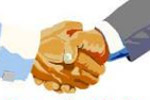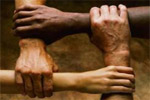Brain Research |
|
Istraživanje mozga |
Why do we cooperate?

|
|
Zašto surađujemo?

|
The prisoner's dilemma

|
|
Zatvorenikova dilema

|
Different kinds of direct reciprocity

|
|
Različite vrste izravnog reciprociteta

|
Spatial selection and kin selection

|
|
Prostorni odabir i odabir po srodstvu

|
Indirect reciprocity

|
|
Neizravni reciprocitet

|
Humans are the most cooperative species

|
|
Ljudi su najkooperativnija vrsta

|
Rapid cultural evolution

|
|
Brza kulturna evolucija

|
Evolutionary simulations

|
|
Evolucijske simulacije

|
|
|
|
|

Why do we cooperate?
Although they may not always play out on such an epic scale, examples of selfless behaviour abound in nature.
Cells within an organism coordinate to keep their division in check and avoid causing cancer, worker ants in many species sacrifice their own fecundity to serve their queen and colony, female lions within a pride will suckle one another's young.
And humans help other humans to do everything from obtaining food to finding mates to defending territory.
Even if the helpers may not necessarily be putting their lives on the line, they are risking lowering their own reproductive success for the benefit of another individual.
For decades biologists have fretted over cooperation, scrambling to make sense of it in light of the dominant view of evolution as "red in tooth and claw", as Alfred, Lord Tennyson so vividly described it.
Charles Darwin, in making his case for evolution by natural selection - wherein individuals with desirable traits reproduce more often than their peers and thus contribute more to the next generation - called this competition the "struggle for life most severe"...
 Search for more... Search for more...
Although they may not always play out on such an epic scale, examples of selfless behaviour abound in nature.
Cells within an organism coordinate to keep their division in check and avoid causing cancer, worker ants in many species sacrifice their own fecundity to serve their queen and colony, female lions within a pride will suckle one another's young.
And humans help other humans to do everything from obtaining food to finding mates to defending territory.
Even if the helpers may not necessarily be putting their lives on the line, they are risking lowering their own reproductive success for the benefit of another individual.
For decades biologists have fretted over cooperation, scrambling to make sense of it in light of the dominant view of evolution as "red in tooth and claw", as Alfred, Lord Tennyson so vividly described it.
Charles Darwin, in making his case for evolution by natural selection - wherein individuals with desirable traits reproduce more often than their peers and thus contribute more to the next generation - called this competition the "struggle for life most severe".
Taken to its logical extreme, the argument quickly leads to the conclusion that one should never ever help a rival and that an individual might in fact do well to lie and cheat to get ahead.
Winning the game of life is all that matters.
Why, then, is selfless behaviour such a pervasive phenomenon?
Over the past two decades I have been using the tools of game theory to study this apparent paradox.
My work indicates that instead of opposing competition, cooperation has operated alongside it from the get-go to shape the evolution of life on earth, from the first cells to humans.
Life is therefore not just a struggle for survival - it is also a snuggle for survival.
And in no case has the evolutionary influence of cooperation been more profoundly felt than in humans.
My findings hint at why this should be the case and underscore that just as helping one another was the key to our success in the past, so, too, is it poised to be vital to our future.
I first became interested in cooperation back in 1987, as a graduate student studying mathematics and biology at the University of Vienna.
While on a retreat with some fellow students and professors in the Alps, I learned about a game theory paradox called "the prisoner's dilemma"; this paradox elegantly illustrates why cooperation has so flummoxed evolutionary biologists.
» Search for more...
|
|

Zašto surađujemo?
Iako se možda ne događaju uvijek u velikim razmjerima, priroda obiluje primjerima nesebičnog ponašanja.
Stanice unutar organizma međusobno su koordinirane kako bi održale svoju razdvojenost i izbjegle nastanak raka, mnoge vrste mrava radnika žrtvuju vlastitu plodnost kako bi služili svojoj matici i koloniji, ženke lavova unutar čopora međusobno doje mladunčad drugih lavica.
A ljudi pomažu jedni drugima u svemu, od pribavljanja hrane preko pronalaženja partnera do obrane teritorija.
Čak i ako pomagači ne stavljaju svoj život na kocku, riskiraju smanjenje vlastitog reproduktivnog uspjeha u korist drugih pojedinaca.
Biologe već desetljećima muči pitanje suradnje te pokušavaju pronaći njezin smisao u odnosu na dominantni stav prema evoluciji kao nečemu "krvavih ralja i kandži", kako ju je slikovito opisao Alfred, Lord Tennyson.
Charles Darwin, braneći svoj stav o evoluciji prirodnim odabirom – pri kojem se pojedinci s poželjnim obilježjima razmnožavaju češće od ostalih te stoga više pridonose sljedećoj generaciji – nazvao je to natjecanje "najopakijom borbom za život"...
 Potraži više... Potraži više...
Iako se možda ne događaju uvijek u velikim razmjerima, priroda obiluje primjerima nesebičnog ponašanja.
Stanice unutar organizma međusobno su koordinirane kako bi održale svoju razdvojenost i izbjegle nastanak raka, mnoge vrste mrava radnika žrtvuju vlastitu plodnost kako bi služili svojoj matici i koloniji, ženke lavova unutar čopora međusobno doje mladunčad drugih lavica.
A ljudi pomažu jedni drugima u svemu, od pribavljanja hrane preko pronalaženja partnera do obrane teritorija.
Čak i ako pomagači ne stavljaju svoj život na kocku, riskiraju smanjenje vlastitog reproduktivnog uspjeha u korist drugih pojedinaca.
Biologe već desetljećima muči pitanje suradnje te pokušavaju pronaći njezin smisao u odnosu na dominantni stav prema evoluciji kao nečemu "krvavih ralja i kandži", kako ju je slikovito opisao Alfred, Lord Tennyson.
Charles Darwin, braneći svoj stav o evoluciji prirodnim odabirom – pri kojem se pojedinci s poželjnim obilježjima razmnožavaju češće od ostalih te stoga više pridonose sljedećoj generaciji – nazvao je to natjecanje "najopakijom borbom za život".
U svojoj logičkoj krajnosti, ta nas tvrdnja brzo dovodi do zaključka da nikada ne treba pomagati suparniku i da pojedinac zapravo čini dobro ako laže i vara da bi napredovao.
Pobijediti u igri života jedino je što je bitno.
Zašto je onda nesebično ponašanje tako česta pojava?
Tijekom posljednja dva desetljeća služio sam se teorijom igara u proučavanju ovog očitog paradoksa.
Moj rad upućuje na to da se suradnja ne suprotstavlja natjecanju, već djeluje paralelno s njime od samih početaka u oblikovanju razvoja života na zemlji, od prvih stanica pa sve do ljudi.
Život stoga nije samo borba za opstanak – on je također i udobni zagrljaj opstanka.
A evolucijski utjecaj suradnje nije nigdje tako dubok kao kod ljudi.
Moja saznanja kazuju zašto je tako te ističu da, kao što je međusobno pomaganje bilo ključno za naš uspjeh u prošlosti, isto tako je važno i za našu budućnost.
Prvi put sam se zainteresirao za suradnju još 1987. godine, kao postdiplomant na studiju matematike i biologije na Sveučilištu u Beču.
Dok sam boravio u Alpama s nekolicinom kolega studenata i profesora, upoznao sam se s paradoksom teorije igara poznatom kao "zatvorenikova dilema"; taj paradoks elegantno ilustrira zašto je suradnja tako zbunila evolucijske biologe.
» Potraži više...
|

The prisoner's dilemma
The dilemma goes like this: Imagine that two people have been arrested and are facing jail sentences for having conspired to commit a crime.
The prosecutor questions each one privately and lays out the terms of a deal.
If one person "rats" on the other and the other remains silent, the incriminator gets just one year of jail time, whereas the silent person gets slammed with a four-year sentence.
If both parties cooperate and do not rat on each other, both get reduced sentences of two years.
But if both individuals incriminate each other, they both receive three-year sentences.
Because each convict is consulted separately, neither knows whether his or her partner will defect or cooperate.
Plotting the possible outcomes, one can see that from an individual's standpoint, the best bet is to incriminate one's partner...
 Search for more... Search for more...
|
|

Zatvorenikova dilema
Dilema je sljedeća: Zamislite da je dvoje ljudi uhićeno i da im prijeti zatvorska kazna za udruživanje zbog počinjenja nekog kaznenog djela.
Tužitelj ispituje svakog zasebno i iznosi im uvjete nagodbe.
Ako jedan izda onoga drugog, a drugi se brani šutnjom, izdajnik dobiva samo jednu godinu zatvora, dok onaj koji se branio šutnjom dobiva kaznu zatvora od četiri godine.
Ako obojica surađuju i ne izdaju jedan drugoga, oba dobivaju smanjenu kaznu od dvije godine.
Ali ako obojica izdaju jedan drugoga, oba dobivaju tri godine zatvora.
Budući da tužitelj sa svakim okrivljenikom razgovara zasebno, nijedan ne zna hoće li ga onaj drugi izdati ili će surađivati.
Razmišljajući o mogućim ishodima, možemo vidjeti da je, sa stajališta pojedinca, najbolje inkriminirati svojeg partnera...
 Potraži više... Potraži više...
|

Different kinds of direct reciprocity
We started with a random distribution of defectors and co-operators, and after each round of the game the winners would go on to produce offspring who would participate in the next round.
The offspring mostly followed their parents' strategy, although random mutations could shift their strategy.
As the simulation ran, we found that within just a few generations all the individuals in the population were defecting in every round of the game.
Then, after some time, a new strategy suddenly emerged: players would start by cooperating and then mirror their opponents' moves, tit for tat.
The change quickly led to communities dominated by co-operators.
This mechanism for the evolution of cooperation among individuals who encounter one another repeatedly is known as direct reciprocity.
Vampire bats offer a striking example.
If a bat misses a chance to feed directly on prey one day, it will beg from its sated peers back at the roost...
 Search for more... Search for more...
|
|

Različite vrste izravnog reciprociteta
Započeli smo sa slučajnim rasporedom "izdajica" i "suradnika", a nakon svakog kruga igre pobjednici bi nastavili stvarati potomstvo koje bi sudjelovalo u sljedećem krugu.
Potomstvo je uglavnom slijedilo strategiju svojih roditelja, iako su slučajne mutacije mogle promijeniti njihovu strategiju.
Tijekom simulacije otkrili smo da su u samo nekoliko generacija svi pojedinci iz populacije pribjegavali izdaji u svakom krugu igre.
Zatim, nakon nekog vremena, naglo se pojavila nova strategija: igrači bi počeli sa suradnjom, a zatim bi oponašali poteze svojih protivnika, vraćajući im milo za drago.
Ta je promjena ubrzo dovela do zajednica u kojima su dominirali suradnici.
Ovaj mehanizam evolucije suradnje među pojedincima koji se stalno međusobno susreću poznat je kao izravni reciprocitet.
Vampirski šišmiši nude zapanjujući primjer toga.
Ako šišmiš jedan dan propusti priliku da se nahrani izravno iz plijena, po povratku u svoje stanište molit će za hranu site članove svoje kolonije...
 Potraži više... Potraži više...
|

Spatial selection and kin selection
A second means by which cooperation may find a foothold in a population is if co-operators and defectors are not uniformly distributed in a population - a mechanism termed spatial selection.
Neighbours (or friends in a social network) tend to help one another, so in a population with patches of co-operators, these helpful individuals- can form clusters that can then grow and thus prevail in competition with defectors.
Spatial selection also operates among simpler organisms.
Among yeast cells, co-operators make an enzyme used to digest sugar.
They do this at a cost to themselves.
Defector yeast, meanwhile, mooch off the co-operators' enzymes instead of making their own...
 Search for more... Search for more...
|
|

Prostorni odabir i odabir po srodstvu
Drugi način pomoću kojega suradnja može pronaći uporište u populaciji je ako "suradnici" i "izdajice" nisu ravnomjerno raspoređeni u stanovništvu – mehanizam koji se naziva prostornim odabirom.
Susjedi (ili prijatelji u društvenoj mreži) skloni su pomagati jedan drugome pa stoga u populaciji s grupicama "suradnika" ti uslužni pojedinci mogu stvoriti skupine koje zatim mogu narasti i tako prevladati u natjecanju s "izdajicama".
Prostorni odabir postoji i među jednostavnijim organizmima.
Kod stanica kvasca "suradnici" stvaraju enzim koji služi za probavljanje šećera.
To čine sebi na štetu.
U međuvremenu, stanice kvasca koje se ponašaju kao "izdajice" otimaju enzime od "suradnika" umjesto da stvaraju vlastite...
 Potraži više... Potraži više...
|

Indirect reciprocity
The fourth mechanism that fosters the emergence of cooperation is indirect reciprocity, which is quite distinct from the direct variety that Sigmund and I studied initially.
In indirect reciprocity, one individual decides to aid another based on the needy individual's reputation.
Those who have a reputation for assisting others who fall on hard times might even find themselves on the receiving end of goodwill from strangers when their own luck takes a turn for the worse.
Thus, instead of the "I will scratch your back if you scratch my mine" mentality, the co-operator in this situation might be thinking, "I will scratch your back, and someone will scratch mine".
Among Japanese macaques, for example, low-ranking monkeys that groom high-ranking ones (which have good reputations) may better their own reputations - and hence receive more grooming - simply by being seen with the top brass...
 Search for more... Search for more...
|
|

Neizravni reciprocitet
Četvrti mehanizam koji potiče pojavu suradnje je neizravni reciprocitet, koji je poprilično različit od izravnog reciprociteta koji sam u početku proučavao sa Sigmundom.
Kod neizravnog reciprociteta, jedan pojedinac odlučuje pomoći drugom na temelju ugleda tog drugog pojedinca.
Pojedinci koje prati glas da pomažu drugima u nevolji mogu čak primiti pomoć od stranaca kada ih napusti sreća.
Stoga, umjesto mentaliteta "pomoći ću ti ako i ti pomogneš meni", "suradnik" u ovoj situaciji možda razmišlja ovako: "ja ću pomoći tebi, a netko drugi će pomoći meni".
Primjerice, među japanskim makakijima, majmuni nižeg ranga koji timare one višeg ranga (koji imaju dobar ugled) mogu poboljšati vlastiti ugled – i stoga biti više timareni – jednostavno tako da ih se vidi u društvu vodećih pojedinaca...
 Potraži više... Potraži više...
|

Humans are the most cooperative species
The five mechanisms governing the emergence of cooperation apply to all manner of organisms, from amoebas to zebras (and even, in some cases, to genes and other components of cells).
This universality suggests that cooperation has been a driving force in the evolution of life on earth from the beginning.
Moreover, there is one group in which the effects of cooperation have proved especially profound: humans.
Millions of years of evolution transformed a slow, defenceless ape into the most influential creature on the planet, a species capable of inventing a mind-boggling array of technologies that have allowed our kind to plumb the depths of the ocean, explore outer space and broadcast our achievements to the world in an instant.
We have accomplished these monumental feats by working together...
 Search for more... Search for more...
|
|

Ljudi su najkooperativnija vrsta
Pet mehanizama koji upravljaju pojavom surađivanja javljaju se kod raznih organizama, od ameba do zebri (pa čak u nekim slučajevima i kod gena i ostalih dijelova stanica).
Na temelju te univerzalnosti možemo zaključiti da je suradnja bila pokretačka sila u evoluciji života na zemlji od samoga početka.
Štoviše, u jednoj skupini su se učinci suradnje pokazali osobito značajnima: kod ljudi.
Milijuni godina evolucije preobrazili su sporog, nezaštićenog čovjekolikog majmuna u najutjecajnije biće na planetu, vrstu sposobnu izmisliti zapanjujući niz tehnologija koje su nam omogućile da dosegnemo dno oceana, istražujemo svemir i razglasimo svoja postignuća svijetu u trenu.
Ostvarili smo monumentalne pothvate putem suradnje...
 Potraži više... Potraži više...
|

Rapid cultural evolution
The interplay between language and indirect reciprocity leads to rapid cultural evolution, which is central to our adaptability as a species.
As the human population expands and the climate changes, we will need to harness that adaptability and figure out ways to work together to save the planet and its inhabitants.
Given our current environmental track record, our odds of meeting that goal do not look great.
Here, too, game theory offers insights.
Certain cooperative dilemmas that involve more than two players are called public goods games.
In this setting, everyone in the group benefits from my cooperation.
All else being equal, though, I increase my payoff by switching from cooperation to defection...
 Search for more... Search for more...
|
|

Brza kulturna evolucija
Međudjelovanje jezika i neizravne uzajamnosti dovodi do brze kulturne evolucije, koja je ključna za našu prilagodljivost kao vrste.
Kako ljudska populacija raste a klima se mijenja, morat ćemo zauzdati tu prilagodljivost i smisliti načine suradnje za spas planeta i njegovih stanovnika.
S obzirom na naš dosadašnji uspjeh u zaštiti okoliša, izgledi da ispunimo taj cilj nisu baš na našoj strani.
I tu nam teorija igre može pružiti korisne spoznaje.
Određene suradničke dileme koje uključuju više od dvaju igrača nazivaju se igrama za opće dobro.
U takvom okruženju svatko u skupini ima korist od moje suradnje.
Međutim, ako sve ostalo ostane isto, ja povećavam svoju korist prelazeći sa suradnje na izdaju...
 Potraži više... Potraži više...
|

Evolutionary simulations
Thankfully, not all hope is lost.
A series of computerized experiments conducted by Manfred Milinski of the Max Planck Institute for Evolutionary Biology in Germany, and his colleagues have revealed several factors that motivate people to be good stewards of the commons in public goods games.
The researchers gave each subject €40 and had them play a game via computer in which the object was to use the money to keep the earth's climate under control.
Participants were told that for each round of the game, they had to donate some of their money into a common pool.
If at the end of 10 rounds there was €120 or more in the common pool, then the climate was safe and the players would go home with the money they had left over.
If they raised less than €120, then the climate would break down and everyone would lose all their money.
Although the players often failed to save the climate, missing the mark by a few euros, the investigators observed differences in their behaviour from round to round that hint at what inspires generosity.
The researchers found that players were more altruistic when they received authoritative information about climate research, indicating that people need to be convinced that there really is a problem to make sacrifices for the greater good...
 Search for more... Search for more...
|
|

Evolucijske simulacije
Srećom, nade još ima.
Niz računalnih eksperimenata koje su proveli Manfred Milinski s Instituta Max Planck za evolucijsku biologiju u Njemačkoj i njegovi kolege otkrili su nekoliko čimbenika koji motiviraju ljude za valjano upravljanje zajedničkim dobrima u igrama za opće dobro.
Istraživači su dali svakom ispitaniku 40 eura i dali im da igraju računalnu igru u kojoj je cilj koristiti novac kako bi održali Zemljinu klimu pod kontrolom.
Sudionicima je rečeno da u svakom krugu igre moraju donirati dio novca za zajednička sredstva.
Ako bi na kraju desetog kruga bilo prikupljeno 120 ili više eura zajedničkih sredstava, klima bi bila spašena i igrači bi otišli kući s novcem koji im je ostao.
Ako bi prikupili manje od 120 eura, klima bi bila nepovratno uništena i svi bi izgubili sav novac.
Iako igrači često nisu uspjeli spasiti klimu, skupivši nekoliko eura manje od potrebnog, istražitelji su zamijetili razlike u njihovu ponašanju iz kruga u krug koje upućuju na odgovor na pitanje što pobuđuje velikodušnost.
Istraživači su otkrili da su igrači bili altruističniji kad su dobili vjerodostojne informacije o klimatskim istraživanjima, što pokazuje da ljudi trebaju biti uvjereni da doista postoji problem kako bi se žrtvovali za opće dobro...
 Potraži više... Potraži više...
|
|
|




